Related Research Articles
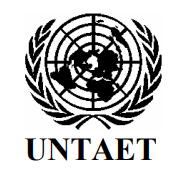
The United Nations Transitional Administration in East Timor (UNTAET),, was a United Nations mission in East Timor that aimed to solve the decades-long East Timorese crisis in the area occupied by Indonesian military. UNTAET provided an interim civil administration and a peacekeeping mission in the territory of East Timor, from its establishment on 25 October 1999, until its independence on 20 May 2002, following the outcome of the East Timor Special Autonomy Referendum. The transitional administration was established by United Nations Security Council Resolution 1272 in 1999.

Military police (MP) are law enforcement agencies connected with, or part of, the military of a state. In wartime operations, the military police may support the main fighting force with force protection, convoy security, screening, rear reconnaissance, logistic traffic management, counterinsurgency, and detainee handling.
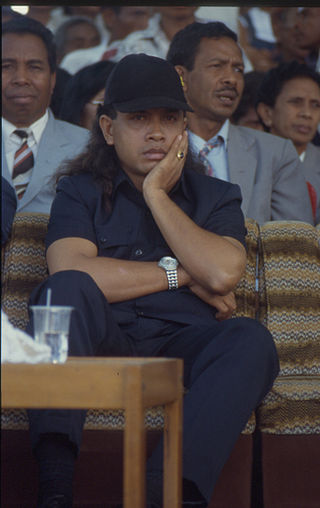
Eurico Barros Gomes Guterres is a pro-Indonesian, anti-Timorese independence militiaman recruited by the Indonesian military during East Timor's bid for independence between 1999 and 2000. He was involved in several massacres in East Timor, and was a chief militia leader during the post-independence massacres and destruction of the capital Dili.

The Canadian Forces National Investigation Service (CFNIS) is the investigative arm of the Canadian Forces Military Police. The CFNIS is an independent military police unit that provides an independent investigative capability for the purpose of fair and impartial administration of military justice.
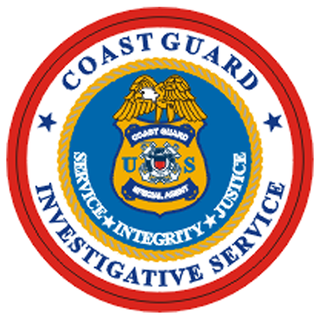
The Coast Guard Investigative Service (CGIS) is a division of the United States Coast Guard that investigates crimes where the U.S. Coast Guard has an interest. It is composed of civilian (GS-1811), active duty, reserve enlisted, and warrant officer special agents.

Liquiçá is one of the municipalities of East Timor. Its capital is also called Liquiçá.
The Liquiçá Church massacre was a mass-killing that occurred in April 1999, during East Timor's bid for independence. It was the first case to be heard by the Second Special Panel.

Besi Merah Putih, meaning 'red and white iron' in Indonesian, was the official name of an East Timor, approximately 200-strong, pro-Indonesia militia (Wanra). It operated in Maubara, in the district of Liquiçá, and in the neighbourhood of the river Lóis, west of the capital Dili, under the leadership of Manuel de Sousa and with the support of Leoneto Martins, the district administrator (Bupati) of Liquiçá. It was founded on 27 December 1998 in Cai-Cassa, East Timor. The Indonesian ex-general Prabowo had direct links to Besi Merah Putih and trained members at a Kopassus base near Bogor in West Java. Tomé Diogo is also rumoured to have direct links to the BMP. The Indonesian army member is said to have led the militia directly.
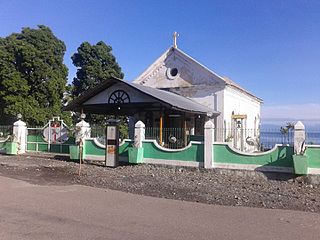
Maubara is a village in Maubara Administrative Post, just west of the city of Liquiçá. Most of the inhabitants speak Tocodede. It lies near the Maubara Important Bird Area, encompassing the small coastal Lake Maubara.

Aitarak was the name of a pro-Indonesia militia group in East Timor during the late 1990s. On April 17, 1999, the group conducted 12 murders at the Manuel Carrascalão House massacre in Dili. That same month members took part in the Liquiçá Church massacre. At its height, the group was led by Eurico Guterres.

Manuel Guterres Viegas Carrascalão was an Indonesian parliamentarian and prominent East Timorese independence leader. The Carrascalão family is of mestiço ancestry;

Liquiçá is a coastal city in East Timor, 32 km to the west of Dili, the national capital. Liquiçá is the capital of Liquiçá District. The city has a population of 5,005 inhabitants.
The Vukovar massacre, also known as the Vukovar hospital massacre or the Ovčara massacre, was the killing of Croatian prisoners of war and civilians by Serb paramilitaries, to whom they had been turned over by the Yugoslav People's Army (JNA), at the Ovčara farm southeast of Vukovar on 20 November 1991, during the Croatian War of Independence. The massacre occurred shortly after Vukovar's capture by the JNA, Territorial Defence (TO), and paramilitaries from neighbouring Serbia. It was the largest massacre of the Croatian War of Independence.
The Serious Crimes Unit was the official title given to an elite unit of International Police investigators during the United Nations 1999 to 2004 mission in East Timor.

The United States Department of the Army Criminal Investigation Division (CID), previously known as the United States Army Criminal Investigation Command (USACIDC), is the primary federal law enforcement agency of the United States Department of the Army. Its primary function is to investigate felony crimes and serious violations of military law and the United States Code within the US Army. The division is an independent federal law enforcement agency with investigative autonomy; CID special agents, both military and civilian, report through the CID chain of command to the CID Director, who reports directly to the Under Secretary of the Army and the Secretary of the Army. Unlike their counterparts at OSI and NCIS, Army CID does not have primary counterintelligence responsibilities.

The Sierra Leone Police (SLP) is the national police force of the Republic of Sierra Leone. It is primarily responsible for law enforcement and crime investigation throughout Sierra Leone. The Sierra Leone Police is under the jurisdiction of the Sierra Leone Ministry of Internal Affairs, a cabinet ministry in the Government of Sierra Leone.
The Special Panels for Serious Crimes was the hybrid international–East Timorese tribunal that was created in 2000 by the United Nations Transitional Administration in East Timor (UNTAET) to try cases of "serious criminal offences" which took place in East Timor in 1999. The Special Panels sat from 2000 to 2006.
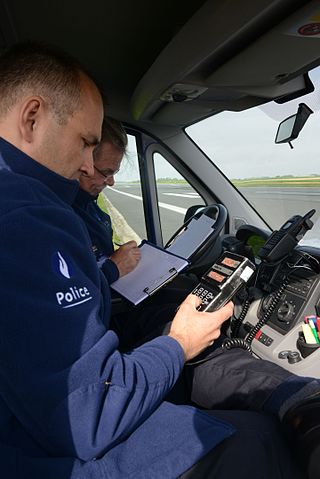
The Belgian Federal Police is the national police force of the Kingdom of Belgium. It carries out specialized and supra-local administrative and judicial police operations, and supports local police services when needed. Additionally, the Federal Police is responsible for patrolling and ensuring the safety of the country's highways. The Federal Police has approximately 12,300 officers and civilian personnel.
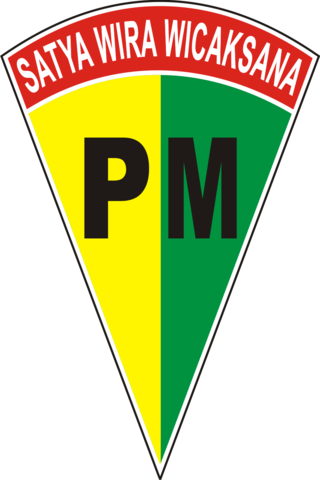
Puspomad or Army Military Police Center, which all of its personnel are part of the Military Police Corps (CPM) is one of the military general technical functions of the Indonesian Army which has the role for administering administrative assistance and as embodiment and guidance through the operation of Military Police functions. Its duties is basically to execute law enforcement towards the military which includes investigation activities and other policing duties within the scope of the army.

United Nations Administered East Timor refers to the period between 25 October 1999 and 20 May 2002 when East Timor was administered by the United Nations Transitional Administration in East Timor as a United Nations protectorate.
References
This article includes a list of references, related reading, or external links, but its sources remain unclear because it lacks inline citations .(April 2009) |
- "21 Indonesian Officers, Militiamen Charged in Liquica Massacre". East Timor and Indonesia Action Network. 23 November 2001. Retrieved 12 June 2017.
- "LtCol (Inf) Asep Kuswani". Masters of Terror. 1 July 2007. Retrieved 12 June 2017.
- https://web.archive.org/web/20060425031821/http://lists.econ.utah.edu/pipermail/marxism/2005-April/023693.html
- https://web.archive.org/web/20061020023805/http://www.commondreams.org/cgi-bin/print.cgi?file=%2Fnews2005%2F0406-04.htm
- https://web.archive.org/web/20060829154235/http://cpa.org.au/garchve05/1223massacre.html
- "Justice Call On East Timor Massacre Anniversary". globalpolicy.org. East Timor Action Network. 6 April 2005. Retrieved 12 June 2017.